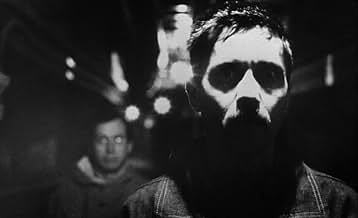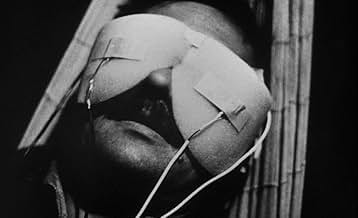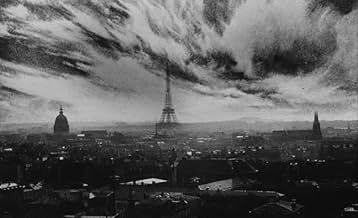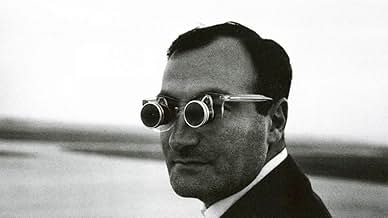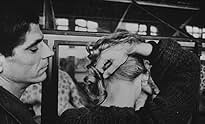IMDb-BEWERTUNG
8,2/10
38.757
IHRE BEWERTUNG
Füge eine Handlung in deiner Sprache hinzuThe story of a man forced to explore his memories in the wake of World War III's devastation, told through still images.The story of a man forced to explore his memories in the wake of World War III's devastation, told through still images.The story of a man forced to explore his memories in the wake of World War III's devastation, told through still images.
- Auszeichnungen
- 2 wins total
Jean Négroni
- Narrator
- (Synchronisation)
- (as Jean Negroni)
Ligia Branice
- A woman from the future
- (as Ligia Borowcyk)
William Klein
- A man from the future
- (as Bill Klein)
James Kirk
- Narrator
- (English version)
- (Synchronisation)
Empfohlene Bewertungen
10tsmiljan
If you can find this rare film, you must see it. Unique in film history, this experimental short film consists of a series of still shots tied together by narration. It is the story of a post-apocalyptic Earth and time travel. Each still shot is a work of art, and the plot is compelling. A man with a strong memory of a past event witnessed as a small child (a person being shot at an airport), is periodically sent back into that pre-war period by "experimenters" with devious purposes. While visiting the past, the hero falls in love with a woman from that past.
Watch for the one and only scene that contains any movement and natural sounds (birds in the background, while the woman wakes up next to her lover). Coming in the midst of the relentless still shots, it is one of the most sublime moments in all cinema. You are doing yourself a disservice if you do not see this film.
Watch for the one and only scene that contains any movement and natural sounds (birds in the background, while the woman wakes up next to her lover). Coming in the midst of the relentless still shots, it is one of the most sublime moments in all cinema. You are doing yourself a disservice if you do not see this film.
10rclusso
I first saw "La Jetee" in an introductory journalism class in the spring of 1973. The class was large, so large, in fact, that it was held in an auditorium rather than a conventional classroom. But when the film ended, there was about 30 seconds of stone-silence before the murmuring began. I sat slack-jawed and stunned and looked at Mary Ann, a girl who sat next to me and who I was slowly becoming friends with, to check her reaction. She looked equally stunned.
Thirty years have passed and I have occasionally revisited that moment. Despite wanting to know Mary Ann better, I was too timid and never saw her again after that semester ended and despite being stunned by the film, for some reason, I had lost track of its title. All I remembered was a haunting scene at an airport with a guy wearing glasses. That was it.
Just the other day and for no reason at all, I remembered the title "La Jetee" out of the blue. The name just popped into my head. And, even stranger, when I was checking the TV listings earlier today, I found that "La Jetee" was being shown on the Sundance Channel later.
I just finished watching it and I am as slack-jawed and stunned as I was thirty years ago. I guess the next logical thing will be to hear from Mary Ann. Just so long as I don't have to meet her at the airport.
Thirty years have passed and I have occasionally revisited that moment. Despite wanting to know Mary Ann better, I was too timid and never saw her again after that semester ended and despite being stunned by the film, for some reason, I had lost track of its title. All I remembered was a haunting scene at an airport with a guy wearing glasses. That was it.
Just the other day and for no reason at all, I remembered the title "La Jetee" out of the blue. The name just popped into my head. And, even stranger, when I was checking the TV listings earlier today, I found that "La Jetee" was being shown on the Sundance Channel later.
I just finished watching it and I am as slack-jawed and stunned as I was thirty years ago. I guess the next logical thing will be to hear from Mary Ann. Just so long as I don't have to meet her at the airport.
"La jetée" is a million years ahead of its time. To make a movie in 1962 about World War III, time traveling and a distant future that is still genuinely disturbing and not in the least outdated comes close to a miracle.
Here's a short synopsis of the story: After World War III Paris is lying in tatters. The earth has been contaminated and survivors of the war have to live underground imprisoned by the victorious nation (it's never said explicitly which nation that is, but they are talking German). Scientists are looking for a way to secure the survival of mankind by exploring the possibilities of time traveling. In the process one of the prisoners, who has a strong connection to the past because of a recurring dream of his childhood, serves as their guinea pig. As the experiments go on the time traveler falls in love with a woman from the past and comes face to face with the childhood memory he's been obsessed with all his life.
The story might have a familiar ring to you. It's basically the same story Terry Gilliam used in "12 Monkeys". But while "12 Monkeys" is a great movie, ultimately it will be "La jetée" that will stand the test of time (no pun intended). Director/screenwriter Chris Marker's approach is amazingly clever and effective. His movie is a sequence of beautiful black and white photographs with somebody narrating the story. The pictures and the perfect music make the whole thing seem like a documentary on World War II and give the movie a disturbingly realistic feel. Marker never makes the mistake to show too much. The destruction of Paris, the experiments and the future are all hinted at rather vaguely in the pictures and in the narration. A lot is left to our imagination and when The Man, as the main character is simply called, drifts through time it almost seems like a feverish dream to the viewer, too. What's more concrete is the relationship of The Man and The Woman and the contrast between the short untroubled moments The Man spends in the past and his enslavement in the present. Marker concentrates on those aspects and almost shrugs the time traveling off as a negligibility and the result is nothing short of amazing.
With its 26 minutes running time "La jetée" accomplishes more than some epic trilogies do. It remains a classy work of art that looks fresher than any other movie from the 60's that I've ever seen and in 50 years from now it will not have lost any of its appeal, either.
Here's a short synopsis of the story: After World War III Paris is lying in tatters. The earth has been contaminated and survivors of the war have to live underground imprisoned by the victorious nation (it's never said explicitly which nation that is, but they are talking German). Scientists are looking for a way to secure the survival of mankind by exploring the possibilities of time traveling. In the process one of the prisoners, who has a strong connection to the past because of a recurring dream of his childhood, serves as their guinea pig. As the experiments go on the time traveler falls in love with a woman from the past and comes face to face with the childhood memory he's been obsessed with all his life.
The story might have a familiar ring to you. It's basically the same story Terry Gilliam used in "12 Monkeys". But while "12 Monkeys" is a great movie, ultimately it will be "La jetée" that will stand the test of time (no pun intended). Director/screenwriter Chris Marker's approach is amazingly clever and effective. His movie is a sequence of beautiful black and white photographs with somebody narrating the story. The pictures and the perfect music make the whole thing seem like a documentary on World War II and give the movie a disturbingly realistic feel. Marker never makes the mistake to show too much. The destruction of Paris, the experiments and the future are all hinted at rather vaguely in the pictures and in the narration. A lot is left to our imagination and when The Man, as the main character is simply called, drifts through time it almost seems like a feverish dream to the viewer, too. What's more concrete is the relationship of The Man and The Woman and the contrast between the short untroubled moments The Man spends in the past and his enslavement in the present. Marker concentrates on those aspects and almost shrugs the time traveling off as a negligibility and the result is nothing short of amazing.
With its 26 minutes running time "La jetée" accomplishes more than some epic trilogies do. It remains a classy work of art that looks fresher than any other movie from the 60's that I've ever seen and in 50 years from now it will not have lost any of its appeal, either.
10myphx
The first time I saw this movie it was on a local educational TV channel (PBS was barely starting) in 1969. I was a youngster and it made such an indelible impression that I remembered it all these years. Luckily, to my surprise I discovered a copy recently at a video rental store.
The movie is only approximately 30 minutes in length and is composed of black and white still photography (except for one scene, where they show a mans eye blinking). It is a powerful depiction of the end of the world, human love and memory. The French narration adds to the poetic subtlety and drama. To my dismay, I heard there was a new DVD version available, but with English narration. Hopefully, the original French version will be made available, as it seems to add so much more to the dramatic effect of the movie.
To the average movie viewer, this film would be best described as avant-garde in nature. It is a prime example of how science fiction and drama can be produced with nuance and subtleties, rather than overuse of technological effects and gratuitous titillation and violence.
The movie is only approximately 30 minutes in length and is composed of black and white still photography (except for one scene, where they show a mans eye blinking). It is a powerful depiction of the end of the world, human love and memory. The French narration adds to the poetic subtlety and drama. To my dismay, I heard there was a new DVD version available, but with English narration. Hopefully, the original French version will be made available, as it seems to add so much more to the dramatic effect of the movie.
To the average movie viewer, this film would be best described as avant-garde in nature. It is a prime example of how science fiction and drama can be produced with nuance and subtleties, rather than overuse of technological effects and gratuitous titillation and violence.
As another reviewer said, this film is "timeless". Although it is from 1962, its story could be relevant in 1862 or 2062. The images presented show an apocalyptic world but also show happy images from another time. The story told is the main composition of this film and although it is short you become connected to the story as its eeriness makes the film unsettling at times.
Overall, its a great film and an amazing piece of art!
Overall, its a great film and an amazing piece of art!
Wusstest du schon
- WissenswertesThis short film was the inspiration for the Terry Gilliam film 12 Monkeys (1995).
- Crazy CreditsThe opening credits do not describe it as a film, but as "un photo-roman".
- VerbindungenEdited into Der Hamster Faktor Und Andere Twelve Monkeys Geschichten (1996)
Top-Auswahl
Melde dich zum Bewerten an und greife auf die Watchlist für personalisierte Empfehlungen zu.
Details
- Erscheinungsdatum
- Herkunftsland
- Sprachen
- Auch bekannt als
- La Jetée
- Drehorte
- Produktionsfirmen
- Weitere beteiligte Unternehmen bei IMDbPro anzeigen
- Laufzeit28 Minuten
- Farbe
- Sound-Mix
- Seitenverhältnis
- 1.66 : 1
Zu dieser Seite beitragen
Bearbeitung vorschlagen oder fehlenden Inhalt hinzufügen

Oberste Lücke
By what name was Am Rande des Rollfelds (1962) officially released in India in English?
Antwort
